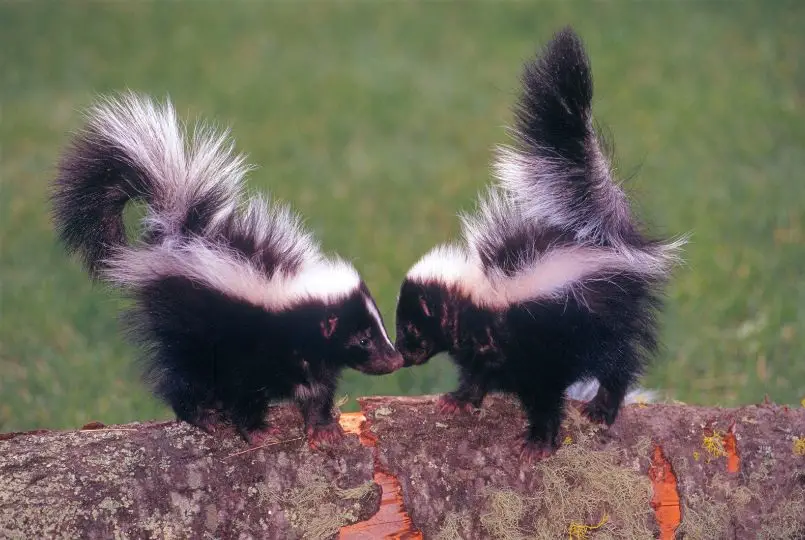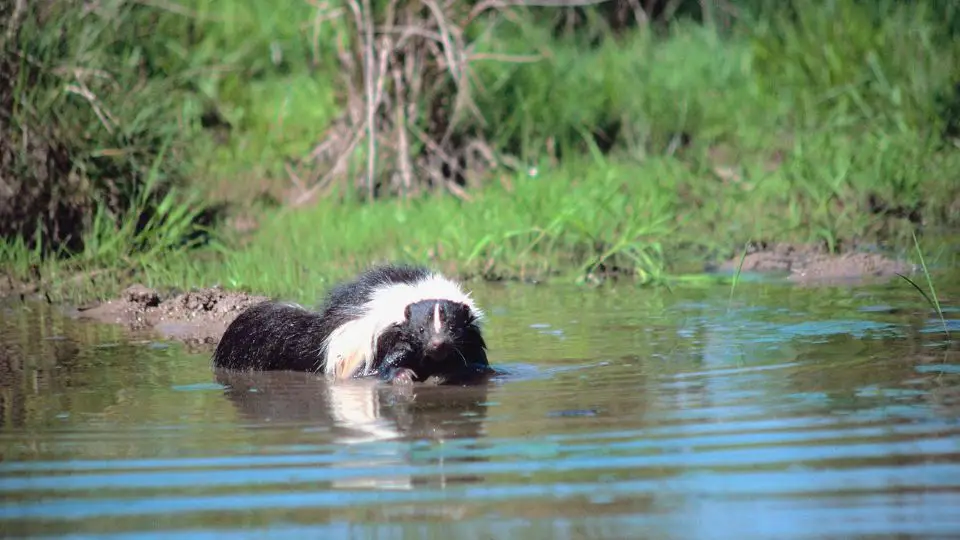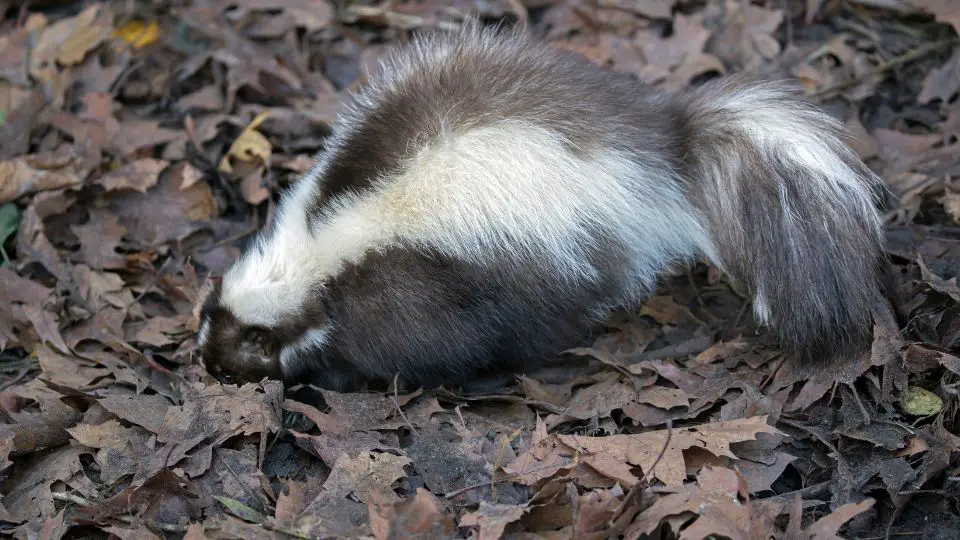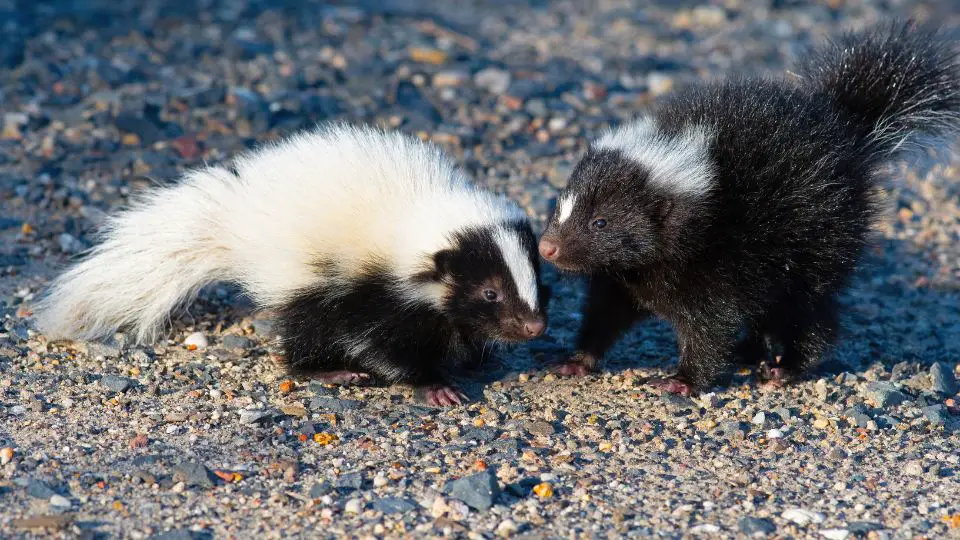Skunks are sensitive to powerful smells, so you can make your own effective skunk repellant at home using either white vinegar, ammonia, citrus peels, peppermint oil, chili powder, or lavender. You can even use predator urine or mothballs to keep skunks away.
It’s no secret that skunks are bothersome creatures. Not only do their infamous musk linger for weeks, but these pests can also wreak havoc in and around your home.
While setting up a live trap and installing wire mesh are effective skunk control measures, you don’t have to resort to these options immediately. A host of common household ingredients can make excellent skunk repellents, such as vinegar, ammonia, and citric scents.
Fortunately, the potency of these homemade repellents is nowhere near as repulsive as the notorious skunk spray. There are few odors as foul as skunk smell.
Luckily, some of these DIY repellents may even be considered aromatic and pleasant, making your home smell divine in the process.
If you’re itching to learn what ingredients you can use to keep skunks away, whether they’re a Pygmy spotted skunk, an American hog-nosed skunk, a Western-spotted skunk (Conepatus leuconotus), or a hooded skunk, keep on reading!
Table of Contents
Natural Skunk Deterrents/Repellents: List
Skunks are omnivores, meaning they can feast on anything from small rodents to fruits. If you spot a creature with white stripes and black fur on your property, they’re likely skunks drawn to a rich source of fruits and grubs to feast on.
While cleaning your property from these food sources can help reduce skunk traffic, it’s not always a foolproof solution.
If other houses in the area provide food sources, or if your livelihood depends on having fruit trees on your property, then you’ll need to take extra steps to ensure these critters stay away.
This is where homemade skunk repellents come into play.
By spraying your property with repellents or placing adequate amounts of it within the vicinity, you can make your property unappealing to skunks like the Humboldt’s hog-nosed skunk and therefore deter them from entering.

Here is a solid list of some of the most effective homemade skunk repellents you can put in a spray bottle:
White Vinegar
A vinegar skunk repellant is an effective deterrent because of its pungent odor. Skunks have sensitive noses, so their sinus cavities get irritated when smelling this sinus-clearing chemical.
Spraying and soaking vinegar in cotton balls or rags are effective deterrents.
Ammonia
Similar to vinegar, ammonia is also a potent skunk deterrent because of its strong smell. Dip ammonia in rags or cotton balls and leave it in areas where you want to ward away skunks.
Citrus fruit peels
Lemon and orange peels are also excellent skunk repellents. Their intense citrus acidic smell will deter skunks from coming near your porches and yards. Just be sure they’re fresh peels, not old and dried out, for it to be most effective.
Peppermint oil
This oil is not only refreshing and invigorating, but it’s also a potent skunk and pest deterrent. The more oil you use, the more powerful its repellent properties will be.
Urine from predators
It’s doubtful that skunks will enter an area where they sense danger. By placing predator urine from dogs, coyotes, and foxes around your property, you can scare them and prevent them from entering.
Chili and chili powder
Chili powder’s hot and spicy nature is another excellent way to keep skunks away.
Lavender
Even though they’re not pungent, lavender is a highly effective skunk deterrent.
Mothballs
Mothballs are commonly used as a skunk deterrent because of their strong smell. However, mothballs are poisonous, so keep them away from children and pets.
Skunk Repellants That Are Also Safe for House Pets
Skunks are found anywhere in North America—from Canada to Mexico—and they often cohabitate with a wide variety of pets.
If you’re looking for a skunk repellent that’s also safe for house pets, the following repellants will do the trick for most North American types of skunks:
- Lavender
- Citrus fruit peels
- White vinegar
- Apple Cider Vinegar
- Baking Soda
- Bleach
In addition, many commercial skunk repellents are safe for humans and animals. Read the label or MSDS before purchasing to see if it’s pet-friendly.

What if Natural Deterrents Don’t Work?
The disadvantage of using natural deterrents is that, over time, their potency wears off, and they need to be replaced.
Some species of skunks may also have already considered your home as their primary den, so you’ll need to take more active measures to change their habitats.
If you want to get rid of skunk species like striped skunks (Mephitis mephitis) or hooded skunks (Mephitis macroura) on your own, there are a few methods you can try.
This includes the following:
- Setting up a baited live trap to lure skunks and relocate them.
- Propping a fence or wire mesh around your property to keep skunks out.
- Installing motion-control lights to scare skunks and pests away.
- Using a solar skunk repelling machine.
If these strategies aren’t working, your next best course of action would be to call in a professional pest control specialist.
These companies have the experience and know-how to properly eliminate skunks like the Eastern spotted skunk (Spilogale putorius) and keep them away ethically.

Getting Rid of Skunk Attractants in Your Yard and Garden
If your home or property is situated in an area prone to skunk sightings, be sure to take some preventative measures to make your property less attractive to them. This can be done by:
- Cleaning up any fallen fruit from trees.
- Picking up pet food and water bowls after your pet has finished eating.
- Clearing away any debris, woodpiles, or trash on your property.
- Trimming back any overgrown bushes or trees.
- Sealing up any sized holes or cracks in your foundation.
- Tightly securing garbage and dumpsters to prevent unwanted entry.
Following the above tips will make your home and property less inviting to skunks and other pests.

